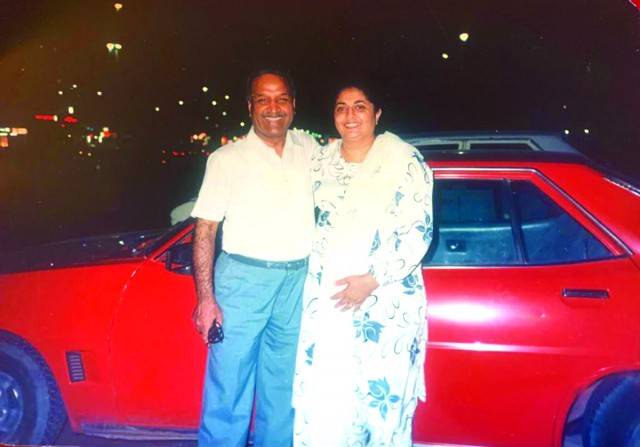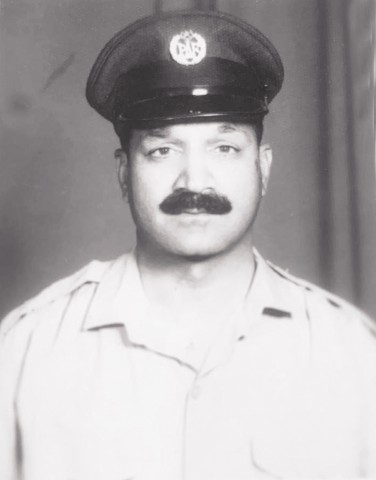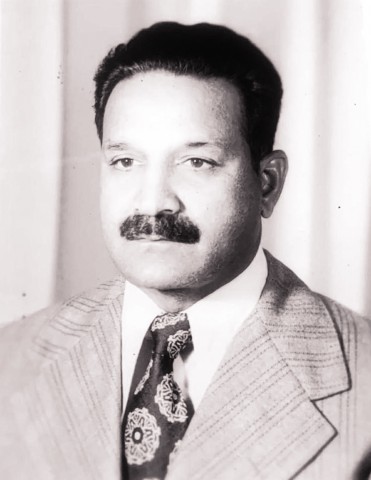
In August 1947, a 17-year-old young man decided to take charge of his destiny and made a life changing decision: he was going to leave his ancestral home in MalerKotla, a city in Indian state of Punjab, and start a new life in independent Pakistan. Like millions of others who chose to migrate to the new country, he wanted to escape the fate that the Muslims of India are facing today and build his life in a place which offered opportunity and a promising future. This young man was Ilyas Ali Khan Sherwani, my grandfather, who succumbed to complications caused by COVID-19 on Wednesday, April 14. On that day, he was one of 118 people in Pakistan who lost their lives in this pandemic. I am writing these words because his demise is much more than a tragic statistic; his life of 91 years embodied an era in modern history, a rich tapestry of experiences and memories which must be preserved.
My grandfather joined the Pakistan Air Force within a few months after he migrated to the country. He chose to serve in the armed forces because he was inspired by a young officer from Madras, who he met on a train to Karachi. My grandfather was an aircraft engineer who completed his 25 years of service when he was only 43 years old. Later in life, he would tell us stories from his days in the air force. And from the way he narrated those tales, it was clear to us that he deeply admired the professionalism of the young air force that he was part of and took great pride in his work during his years of service. He spoke fondly of a grounded C-130 aircraft which his team repaired after it had been shelled multiple times by Indian jets. He had many tales from the Officer’s Mess, of petty jealousies and intrigues, as well as of the camaraderie and strong bonds between the officers he worked with. He spoke of their enthusiasm and patriotic zeal when the first war with India broke out in 1965. He also spoke of their anger and disillusionment after the fall of Dhaka in 1971.

After he retired from Pakistan Airforce in 1973, my grandfather worked with the Kuwait’s air force for another five years, before he joined a Kuwaiti construction company. There, he worked for two decades before he retired and returned home to Pakistan with his family in the early 2000s. By the time his retirement life began, he had six grandchildren and he spent many leisurely years with his family before the pandemic struck. Although he tried his best to avoid it, the virus eventually caught up with him in the third wave.
It is impossible to describe all the adventures of such a long life in a few hundred words and do justice to such a fantastic journey. But this obituary would be incomplete without mention of the time when my grandfather drove 21 days from Kuwait to Pakistan following Iraq’s invasion in 1990. This was a moment of great upheaval and uncertainty; after the invasion, many Pakistani families chose to return home because it was no longer safe to work or live in Kuwait. My grandfather, his wife and young daughter packed their suitcases, strapped them on top of a carrier attached to the car and set off for Pakistan. He drove his family from Kuwait to Iraq, then moved towards Turkey after which he entered Iran and then finally Pakistan. Some of their items got stolen, others fell off their vehicle in transit. There was a week-long wait at one of the borders and my grandfather and his young family camped in their car during this time. He was exhausted and had a fever when they reached Quetta. Even though it was an arduous journey, my grandfather always described it with a great sense of accomplishment. He never complained about the hardships he endured in life: he simply took pride in overcoming them through resolve and perseverance.

My grandfather was a virtuous man and at the end of such a long, fulfilled life, he left us with some simple but powerful lessons. First, he taught us the importance of personal discipline and hard work. Years in the air force instilled these values in him and they served him all his life and even contributed to its longevity. When he retired from Al Kharafi Construction in Kuwait, his colleagues threw a grand farewell party for him. His honesty, humility and hard work were mentioned in all speeches. “Even angels would have made commissions in this job, but he remained upright and honest,” one of his colleagues said.
Every day, he would wake at the crack of dawn, go to the mosque for Fajar prayers and then straight to the park for a brisk walk and exercise. He never acquired any ailments common among the geriatric population and remained fit all his life. He dressed immaculately and took great care of himself. He was also very punctual and a creature of routine, so much so that we could accurately predict what he would be doing at any hour of the day.
Second, my grandfather, a deeply religious man, taught us the value of faith and how it provides orientation and purpose to life. I was living with my grandparents when I was a student at Kinnaird College. One evening, after Isha prayers, he returned from the mosque beaming with pride and delight. He was carrying an ornate copy of the Holy Quran in his arms. The imam at the mosque had gifted it to him, after seeing him in prayer five times a day, for decades. My grandfather observed fasts during Ramzan with great enthusiasm all his life and never skipped a single day in the holy month. When he was working with Kuwait Air Force, he would be on the tarmac under the blazing desert sun for hours. Even then he would fast, battling hunger and dehydration under those harsh conditions. Some people simply refused to believe it; they thought he was secretly drinking water while pretending to fast.
Third, my grandfather taught us the importance of community, charity and generosity. Even though he migrated to Pakistan, he maintained contact with his relatives in India. Once upon a time, they belonged to an illustrious princely family but as decades passed, their fortunes declined and financial hardships set in. Besides donating generously among the needy in Pakistan, my grandfather also aided his family in India throughout his life. He never sought excessive wealth, nor was he particularly impressed by it.
Finally, through sheer dedication and love, my grandfather showed us the value of family. He inspired my mother to become a doctor, sent his son to the United States to pursue his education and his youngest daughter went on to complete her PhD in linguistics. His entire life revolved around his wife and children; all his efforts and struggles were for their well-being. He had individual relationships with all his grandchildren, nieces and nephews and he was delighted when we asked him to participate in the events of our lives. He was with us on our first picnics, visits to the zoo, the museum and historical sites, and we returned to these places with him many times over the years. He was the person we turned to when we needed someone to make special prayers for us and has set a high example for us in life. He was a gentle, unimposing man who commanded so much respect. It was very easy to love him.
As his eldest granddaughter, I am grateful that I got so much of his time and love. He encouraged me to read and write since I was a child and he nurtured my dream of becoming a journalist one day. He has left me countless stories, birthday cards, photographs and memories. Rest in peace my beloved Nana Jan. Until we meet again.
The writer is News Editor of The Friday Times and can be reached on Twitter @aimamk
My grandfather joined the Pakistan Air Force within a few months after he migrated to the country. He chose to serve in the armed forces because he was inspired by a young officer from Madras, who he met on a train to Karachi. My grandfather was an aircraft engineer who completed his 25 years of service when he was only 43 years old. Later in life, he would tell us stories from his days in the air force. And from the way he narrated those tales, it was clear to us that he deeply admired the professionalism of the young air force that he was part of and took great pride in his work during his years of service. He spoke fondly of a grounded C-130 aircraft which his team repaired after it had been shelled multiple times by Indian jets. He had many tales from the Officer’s Mess, of petty jealousies and intrigues, as well as of the camaraderie and strong bonds between the officers he worked with. He spoke of their enthusiasm and patriotic zeal when the first war with India broke out in 1965. He also spoke of their anger and disillusionment after the fall of Dhaka in 1971.

After he retired from Pakistan Airforce in 1973, my grandfather worked with the Kuwait’s air force for another five years, before he joined a Kuwaiti construction company. There, he worked for two decades before he retired and returned home to Pakistan with his family in the early 2000s. By the time his retirement life began, he had six grandchildren and he spent many leisurely years with his family before the pandemic struck. Although he tried his best to avoid it, the virus eventually caught up with him in the third wave.
My grandfather was a virtuous man and at the end of such a long, fulfilled life, he left us with some simple but powerful lessons
It is impossible to describe all the adventures of such a long life in a few hundred words and do justice to such a fantastic journey. But this obituary would be incomplete without mention of the time when my grandfather drove 21 days from Kuwait to Pakistan following Iraq’s invasion in 1990. This was a moment of great upheaval and uncertainty; after the invasion, many Pakistani families chose to return home because it was no longer safe to work or live in Kuwait. My grandfather, his wife and young daughter packed their suitcases, strapped them on top of a carrier attached to the car and set off for Pakistan. He drove his family from Kuwait to Iraq, then moved towards Turkey after which he entered Iran and then finally Pakistan. Some of their items got stolen, others fell off their vehicle in transit. There was a week-long wait at one of the borders and my grandfather and his young family camped in their car during this time. He was exhausted and had a fever when they reached Quetta. Even though it was an arduous journey, my grandfather always described it with a great sense of accomplishment. He never complained about the hardships he endured in life: he simply took pride in overcoming them through resolve and perseverance.

My grandfather was a virtuous man and at the end of such a long, fulfilled life, he left us with some simple but powerful lessons. First, he taught us the importance of personal discipline and hard work. Years in the air force instilled these values in him and they served him all his life and even contributed to its longevity. When he retired from Al Kharafi Construction in Kuwait, his colleagues threw a grand farewell party for him. His honesty, humility and hard work were mentioned in all speeches. “Even angels would have made commissions in this job, but he remained upright and honest,” one of his colleagues said.
Every day, he would wake at the crack of dawn, go to the mosque for Fajar prayers and then straight to the park for a brisk walk and exercise. He never acquired any ailments common among the geriatric population and remained fit all his life. He dressed immaculately and took great care of himself. He was also very punctual and a creature of routine, so much so that we could accurately predict what he would be doing at any hour of the day.
Second, my grandfather, a deeply religious man, taught us the value of faith and how it provides orientation and purpose to life. I was living with my grandparents when I was a student at Kinnaird College. One evening, after Isha prayers, he returned from the mosque beaming with pride and delight. He was carrying an ornate copy of the Holy Quran in his arms. The imam at the mosque had gifted it to him, after seeing him in prayer five times a day, for decades. My grandfather observed fasts during Ramzan with great enthusiasm all his life and never skipped a single day in the holy month. When he was working with Kuwait Air Force, he would be on the tarmac under the blazing desert sun for hours. Even then he would fast, battling hunger and dehydration under those harsh conditions. Some people simply refused to believe it; they thought he was secretly drinking water while pretending to fast.
Third, my grandfather taught us the importance of community, charity and generosity. Even though he migrated to Pakistan, he maintained contact with his relatives in India. Once upon a time, they belonged to an illustrious princely family but as decades passed, their fortunes declined and financial hardships set in. Besides donating generously among the needy in Pakistan, my grandfather also aided his family in India throughout his life. He never sought excessive wealth, nor was he particularly impressed by it.
Finally, through sheer dedication and love, my grandfather showed us the value of family. He inspired my mother to become a doctor, sent his son to the United States to pursue his education and his youngest daughter went on to complete her PhD in linguistics. His entire life revolved around his wife and children; all his efforts and struggles were for their well-being. He had individual relationships with all his grandchildren, nieces and nephews and he was delighted when we asked him to participate in the events of our lives. He was with us on our first picnics, visits to the zoo, the museum and historical sites, and we returned to these places with him many times over the years. He was the person we turned to when we needed someone to make special prayers for us and has set a high example for us in life. He was a gentle, unimposing man who commanded so much respect. It was very easy to love him.
As his eldest granddaughter, I am grateful that I got so much of his time and love. He encouraged me to read and write since I was a child and he nurtured my dream of becoming a journalist one day. He has left me countless stories, birthday cards, photographs and memories. Rest in peace my beloved Nana Jan. Until we meet again.
The writer is News Editor of The Friday Times and can be reached on Twitter @aimamk

